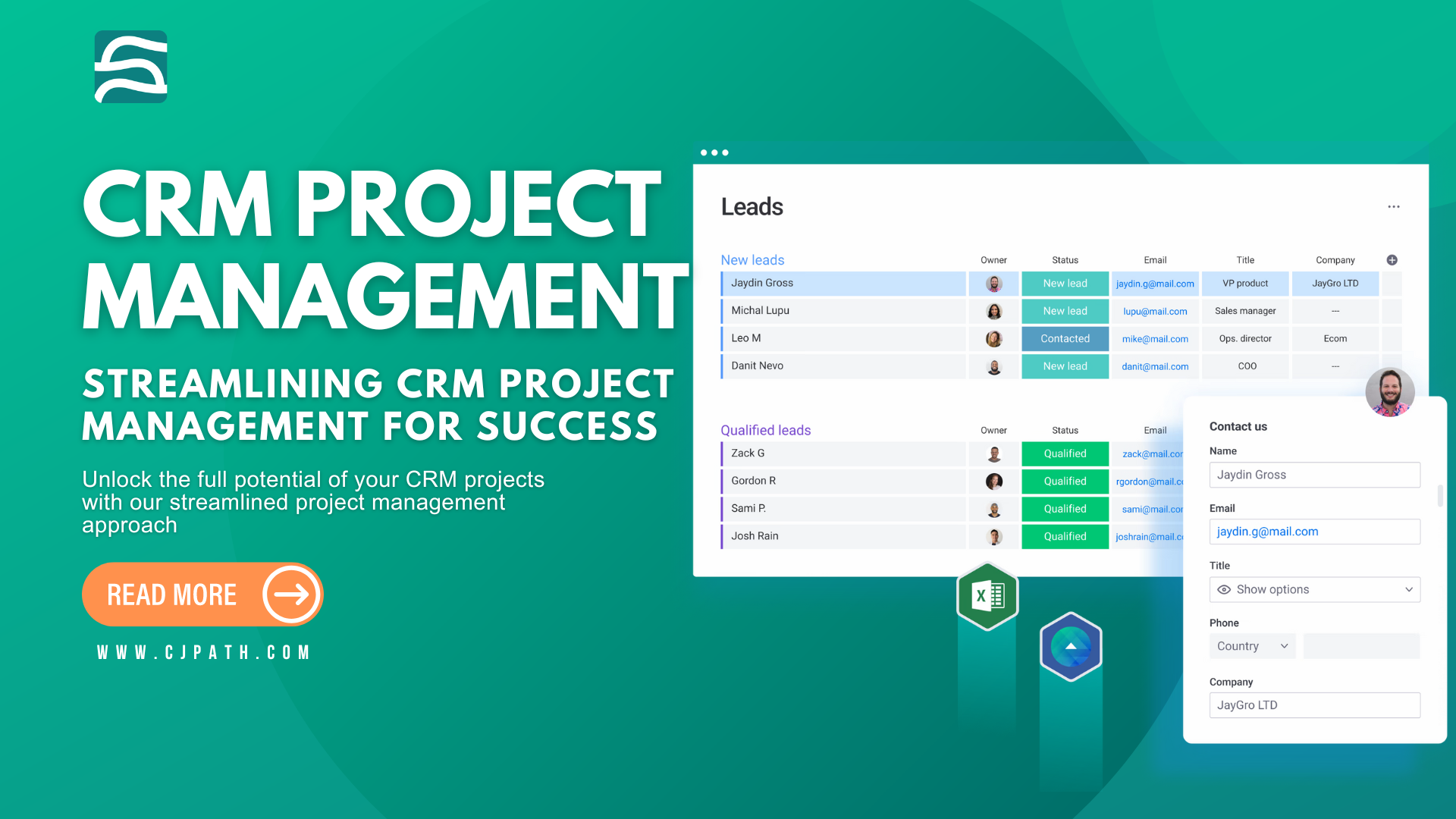
Managing a customer relationship management (CRM) project can be a daunting task.
With multiple stakeholders, complex timelines, and a variety of tasks to juggle, it's easy for things to fall through the cracks.
That's why it's crucial to have a streamlined CRM project management process in place to ensure success.
In this article, we'll explore the importance of CRM project management and how to streamline it for success.
Why Is CRM Project Management Important?
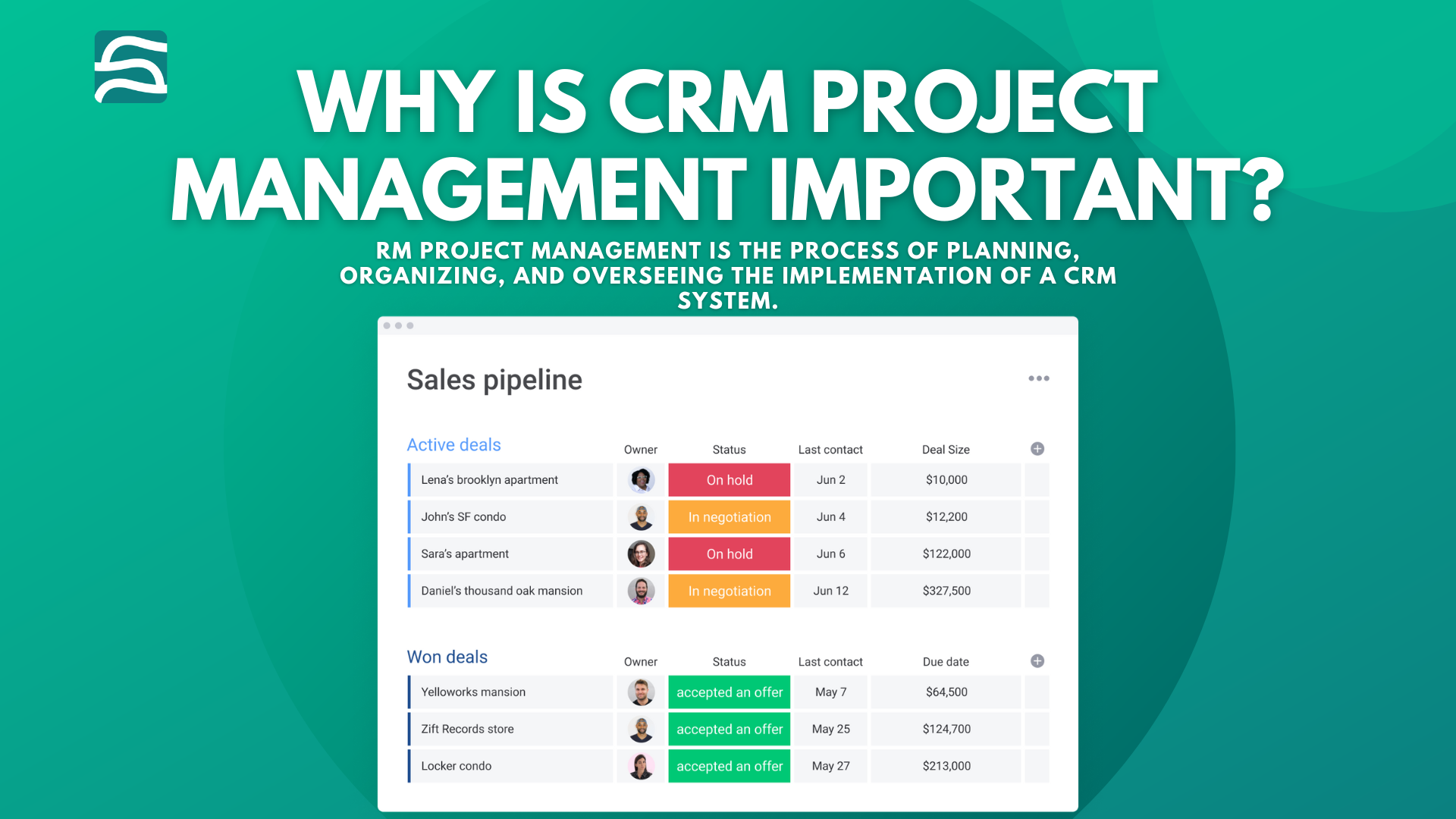
CRM project management is the process of planning, organizing, and overseeing the implementation of a CRM system.
It involves coordinating with various teams, setting timelines, and ensuring that the project stays on track.
Effective CRM project management is crucial for the success of a CRM implementation.
It helps to ensure that the project is completed on time, within budget, and meets the needs of the organization.
It also allows for better communication and collaboration between teams, leading to a more efficient and effective implementation.
Improved Collaboration and Communication
One of the main benefits of CRM project management is improved collaboration and communication between teams.
By having a designated project manager, teams can work together more effectively and efficiently.
This leads to a smoother implementation process and a higher chance of success.
Better Resource Management
CRM project management is a necessary tool for successfully executing projects and managing resources.
By implementing a well-defined plan and establishing a comprehensive timeline, project teams are able to optimize resource allocation, thereby enhancing efficiency and productivity.
This method also helps to avoid problems and delays, ensuring that the project progresses smoothly and meets the deadline.
In addition, using CRM project management makes it easier for organizations to manage their resources effectively.
This helps them stick to their budget and prevents any extra costs. It also promotes financial stability throughout the project's duration.
Increased Efficiency and Productivity
Teams can work better and get more done when they have a clear plan for managing projects with CRM. When everyone knows what they need to do and when it needs to be done, communication and coordination improve.
This improved teamwork helps us work together better and stay organized. It makes sure we take all the necessary steps on time and increases the chances of successfully setting up the CRM system.
How to Streamline CRM Project Management
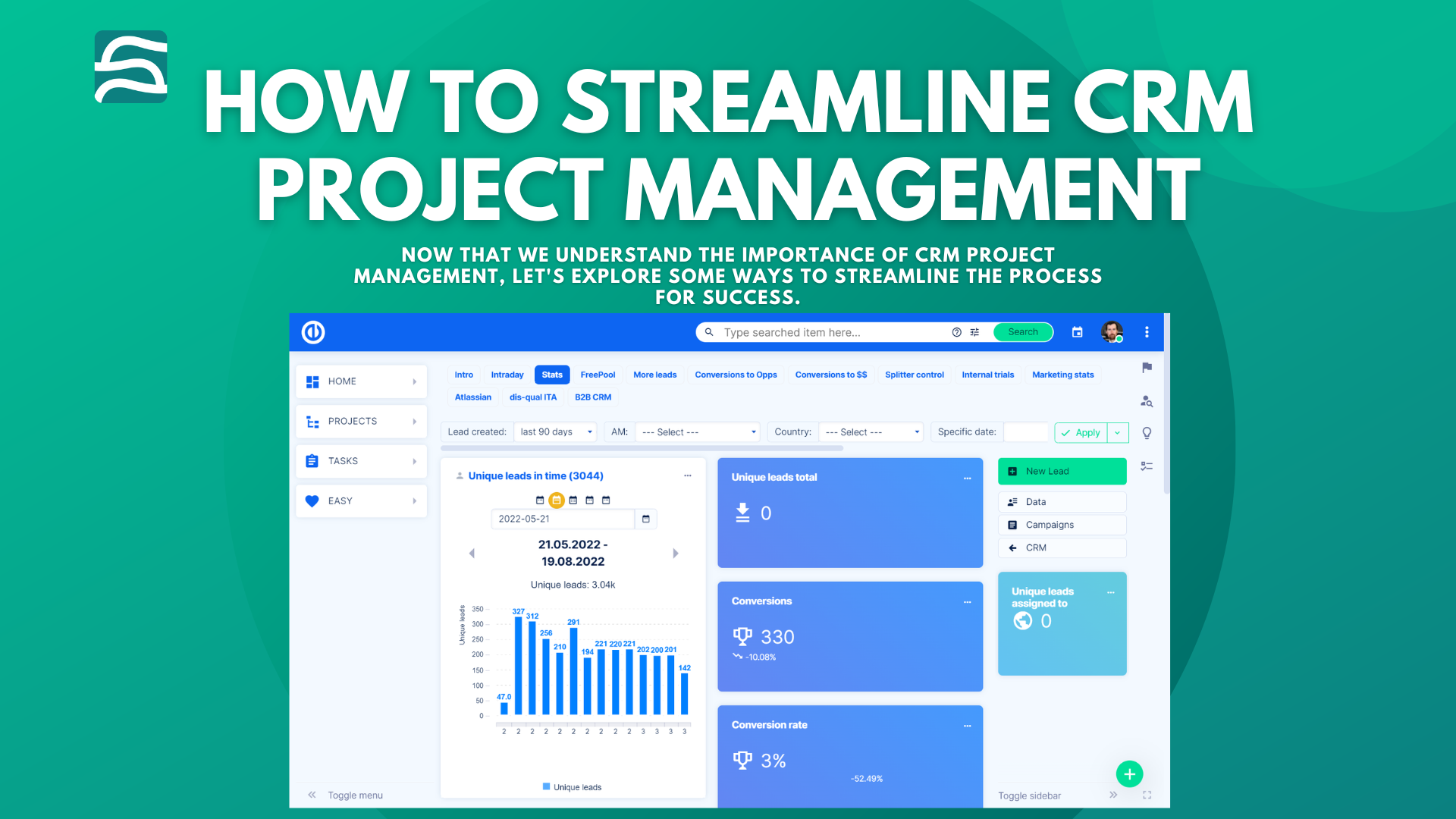
Now that we understand the importance of CRM project management, let's explore some ways to streamline the process for success.
Define Clear Goals and Objectives
Before starting any CRM project, it's essential to define clear goals and objectives.
This will help guide the project and ensure that everyone is working towards the same end goal.
It is important to let everyone know about these goals and objectives so that we are all on the same page.
Utilize Project Management Software
Project management software can be a game-changer when it comes to streamlining CRM project management.
It allows for better organization, communication, and collaboration between teams.
Project management software helps to keep projects on track and ensure their success. It has features such as task management, timelines, and team communication.
Assign a Dedicated Project Manager
Having a dedicated project manager is crucial for the success of a CRM project.
This person will be responsible for overseeing the project, coordinating with teams, and ensuring that everything stays on track.
They will also be the main point of contact for any questions or concerns, making it easier to manage the project.
Create a Detailed Project Plan
A detailed project plan is essential for streamlining CRM project management. It should include all tasks, timelines, and dependencies to ensure that everything is completed in the correct order.
This plan should be shared with all stakeholders and updated regularly to reflect any changes or delays.
Communicate Regularly with Stakeholders
Communication is key when it comes to CRM project management.
It's crucial to keep all stakeholders informed of the project's progress, any changes, and any potential roadblocks.
This will help manage expectations and ensure that everyone is on the same page.
Conduct Regular Check-Ins and Reviews
Regular check-ins and reviews are crucial for the success of a CRM project.
This allows for any issues or concerns to be addressed promptly, and any necessary adjustments to be made.
It also provides an opportunity to celebrate successes and keep the project moving forward.
Real-World Examples of Streamlined CRM Project Management
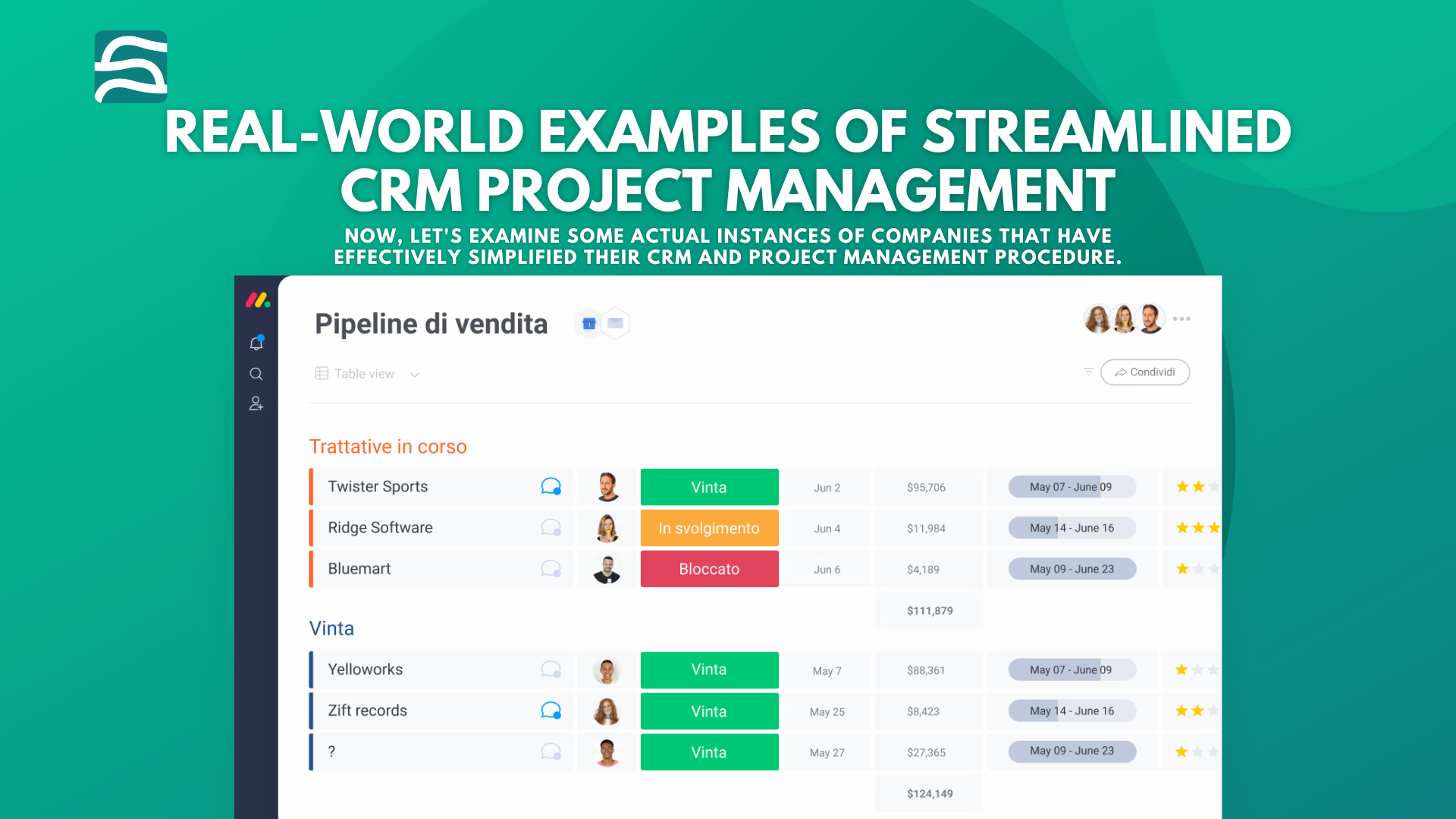
Now, let's examine some actual instances of companies that have effectively simplified their CRM and project management procedure.
Salesforce
Salesforce is a leading CRM software provider that has a reputation for successful CRM implementations.
They have a dedicated project management team that oversees all implementations and ensures that everything stays on track.
They also utilize project management software to keep teams organized and on the same page.
HubSpot
HubSpot CRM is a popular customer relationship management (CRM) software that offers a range of features for managing customer relationships.
One of its main features is its user-friendly interface, which makes it easy for businesses to navigate and use the software effectively.
HubSpot CRM allows businesses to track and manage their contacts, deals, and tasks in one centralized platform.
It also provides features for email tracking, document sharing, and team collaboration, which help improve communication and productivity.
Additionally, HubSpot CRM offers integration with other HubSpot tools, such as marketing automation and customer support, allowing businesses to streamline their CRM processes and enhance overall efficiency.
Microsoft Dynamics 365
Microsoft Dynamics 365 is a popular CRM software that offers a comprehensive suite of tools for managing customer relationships. It is designed to help businesses streamline their customer relationship management processes and improve overall efficiency and productivity.
One of the key features of Microsoft Dynamics 365 is its ability to integrate with other Microsoft products, such as Outlook and Excel. This allows for seamless data sharing and collaboration across different departments and teams within an organization.
Microsoft Dynamics 365 offers a wide range of functionalities, including sales automation, customer service management, marketing automation, and field service management.
These features enable businesses to effectively manage their sales pipeline, provide excellent customer service, execute targeted marketing campaigns, and efficiently manage field service operations.
The software also provides advanced analytics and reporting capabilities, allowing businesses to gain valuable insights into their customer data and make data-driven decisions.
With adjustable dashboards and reports, users can easily track key performance indicators and monitor the success of their CRM initiatives.
Overall, Microsoft Dynamics 365 is a powerful CRM solution that helps businesses optimize their customer relationship management processes and drive growth.
With its comprehensive features, integration capabilities, and cloud-based deployment option, it is a popular choice for organizations looking to streamline their CRM project management.
Zoho CRM
Zoho CRM is a leading customer relationship management (CRM) software that offers a range of features for managing customer relationships. It is designed to help businesses streamline their CRM processes and improve overall efficiency and productivity.
Zoho CRM provides a comprehensive set of tools for sales, marketing, and customer support. It allows businesses to effectively manage their sales pipeline, track leads and opportunities, automate sales processes, and generate sales reports and analytics.
The software also includes features for managing customer support tickets, tracking customer interactions, and providing personalized customer service.
Zoho CRM offers a range of features for managing customer relationships and streamlining CRM project management processes. Some of the main features of Zoho CRM include:
- Contact Management: Zoho CRM allows businesses to effectively manage their contacts by providing tools for tracking customer interactions, storing contact information, and managing customer support tickets.
- Sales Automation: The software includes features for managing the sales pipeline, tracking leads and opportunities, and automating sales processes. This helps businesses streamline their sales operations and improve overall efficiency.
- Marketing Automation: Zoho CRM offers marketing automation capabilities, allowing businesses to execute targeted marketing campaigns, track the success of their marketing initiatives, and generate more leads.
- Customer Support: Zoho CRM includes features for managing customer support tickets, tracking customer interactions, and providing personalized customer service. This helps businesses provide excellent customer support and enhance customer satisfaction.
- Analytics and Reporting: Zoho CRM provides advanced analytics and reporting capabilities, allowing businesses to gain valuable insights into their customer data, track key performance indicators, and make data-driven decisions.
- Integration: Zoho CRM offers integration with popular third-party applications, allowing businesses to leverage their existing tools and workflows. This helps businesses streamline their processes and improve overall productivity.
- Mobile Access: Zoho CRM provides mobile access, allowing users to access CRM data and perform tasks on the go. This enhances flexibility and productivity for businesses with remote or mobile teams.
- Personalization: Zoho CRM is highly customizable, allowing businesses to tailor the software to their specific needs and workflows. Users can create custom fields, layouts, and modules to match their unique business requirements.
- Workflow Automation: Zoho CRM offers workflow automation capabilities, allowing businesses to automate repetitive tasks, streamline processes, and improve overall efficiency.
- Collaboration: Zoho CRM includes collaboration features, such as shared calendars, document sharing, and team collaboration tools. This helps teams work together more effectively and improves communication and collaboration within the organization.
These are some of the main features of Zoho CRM that can help businesses streamline their CRM project management and improve overall efficiency and productivity.
Oracle CRM
Oracle CRM is a robust CRM solution that helps businesses streamline their customer relationship management processes.
They have a well-defined project management approach that includes detailed project plans, regular communication with stakeholders, and effective resource management.
SAP CRM
SAP CRM is a powerful CRM software that helps businesses optimize their customer relationship management processes.
They have a dedicated project management team that ensures successful implementation by defining clear goals, utilizing project management software, and conducting regular reviews.
CJPath CRM
CJPath CRM is another CRM software that can be added to the list of examples of companies that have effectively streamlined their CRM project management processes.
CJPath CRM offers a range of features for managing customer relationships and has a streamlined project management process that includes clear goals, effective communication, and regular check-ins to ensure project success.
CJPath CRM is a CRM software that offers a range of features for managing customer relationships and streamlining CRM project management processes. Some of the key features of CJPath CRM include:
- Customer Relationship Management: CJPath CRM allows businesses to effectively manage their customer relationships by providing tools for tracking customer interactions, managing customer support tickets, and providing personalized customer service.
- Sales Automation: The software includes features for managing the sales pipeline, tracking leads and opportunities, and automating sales processes. This helps businesses streamline their sales operations and improve overall efficiency.
- Marketing Automation: CJPath CRM offers marketing automation capabilities, allowing businesses to execute targeted marketing campaigns and track the success of their marketing initiatives. This helps businesses generate more leads and improve their marketing ROI.
- Project Management: CJPath CRM has a streamlined project management process that includes clear goals, effective communication, and regular check-ins to ensure project success. This helps businesses manage their CRM projects more efficiently and effectively.
- Customization: CJPath CRM is highly customizable, allowing businesses to tailor the software to their specific needs and workflows. Users can create custom fields, layouts, and modules to match their unique business requirements.
- Integration: CJPath CRM offers integration with popular third-party applications, allowing businesses to leverage their existing tools and workflows. This helps businesses streamline their processes and improve overall productivity.
- Cloud-Based Deployment: CJPath CRM offers a cloud-based deployment option, which provides flexibility and expandability,for businesses of all sizes: The cloud-based solution allows for easy access to CRM data from anywhere, at any time, and eliminates the need for on-premises infrastructure and maintenance.
Overall, CJPath CRM is a powerful CRM solution that helps businesses optimize their customer relationship management processes and streamline their CRM project management.
With its range of features, customization options, and cloud-based deployment, it is a popular choice for organizations looking to improve their CRM operations.
These are just a few examples of companies that have successfully streamlined their CRM project management processes.
Each company may have its own unique approach, but the key is to have clear goals, effective communication, and a dedicated project manager to ensure project success.
Who Is Responsible for CRM Project Management?
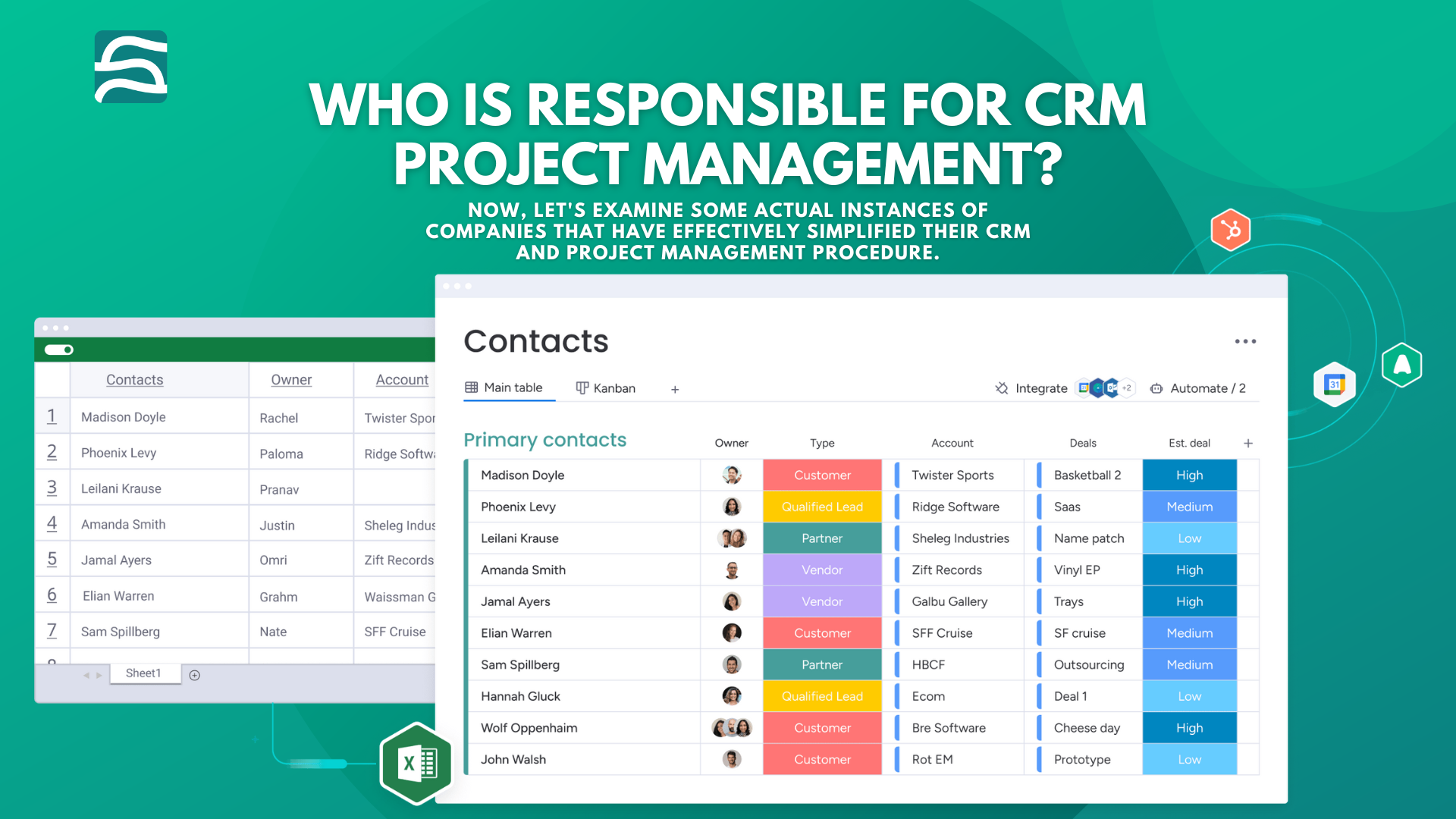
The responsibility for CRM and project management software typically falls on the project manager.
This person is responsible for overseeing the project, coordinating with teams, and ensuring that everything stays on track.
They should have excellent communication and organizational skills and be able to manage multiple tasks and stakeholders.
Takeaways
Streamlining CRM project management software is crucial for the success of a CRM implementation.
Teams can work better by setting clear goals and objectives, using project management tools, and assigning a project manager.
Regular communication and check-ins are also essential for keeping the project on track and addressing any issues promptly.
By following these best practices, you can ensure a successful CRM project implementation.

